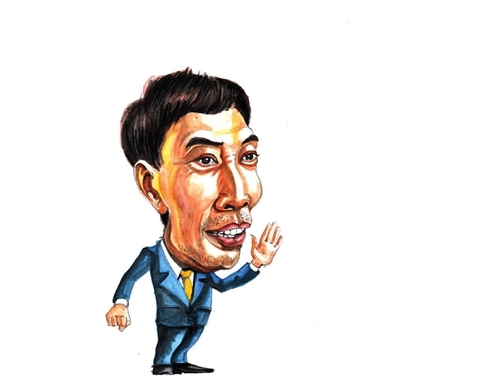The Government’s new growth target of 4 per cent this year, though ambitious, could still be achieved if policy implementation is organised well.

In a national teleconference last week, Prime Minister Nguyen Xuan Phuc asked for concerted efforts to achieve a growth rate of 4 per cent this year.
This target is much lower than the initial goal of 6.8 per cent set for 2020 but is still a high-reaching point if we look at the six-month economic data revealed by the General Statistics Office (GSO).
Viet Nam’s gross domestic product (GDP) in the first half of this year was estimated to increase by just 1.81 per cent over the same period last year, the lowest six-month growth rate in the last three decades and expansion in the second quarter was just 0.36 per cent.
In the last six months, the new COVID-19 pandemic has had catastrophic impacts on the world economy. As a highly open economy, Viet Nam had no chance to escape the negative consequences of the pandemic, especially when its major trading partners have slipped into deep recessions.
Sharing a land border with China where the virus first emerged, Viet Nam was among the earliest countries to act to control the disease, leading to economic stagnation. In addition, Vietnamese companies are deeply involved in the global production chain, so when the supply was disrupted, their production was also negatively affected.
The index of industrial production (IIP) in the first six months recorded 10-year low growth of 2.71 per cent, of which manufacturing increased by 4.96 per cent, data of GSO revealed.
A GSO survey of enterprises in the manufacturing sector in the second quarter showed 40.8 per cent of enterprises pointed to difficulties while 31.9 per cent of enterprises said their business and production situation was stable and 27.3 per cent rated their business better.
Other indicators on import-export value, foreign direct investment capital, new business establishment, social investment capital and stock market performance all declined, painting a gloomy picture for Viet Nam’s economy.
However, the situation has improved since May and June when the economy restarted after a three-week lockdown in April, much faster than other countries.
The manufacturing sector returned to growth in June with the Vietnam Manufacturing Purchasing Managers’ Index (PMI) posting 51.1, up from 42.7 in May and a continuation of the recovery since the PMI hit a record low 32.7 in April.
Exports of some products have sustained while domestic tourism, transportation, aviation and retail have begun to recover.
Viet Nam has been lauded by the international community for its success in containing the disease and become an exemplary response to the pandemic. The economic growth rate is a 30-year low but is positive given most countries in the world recorded negative growth.
Both the World Bank and International Monetary Fund forecast the world economy will suffer negative growth in 2020. While five leading ASEAN economies are also expected to contract, Viet Nam is predicted to grow by 2.7 per cent this year.
Viet Nam’s achievement has been built on its success in the fight against the COVID-19 pandemic and reopening of the economy without the return of the disease.
The introduction of a series of the Government support policies which ranged from monetary, tax and fees, investment, interest rate reduction and social welfare have aided business operation.
In June, more than 13,700 new businesses were established and 100,000 registered labourers, a rise of nearly 28 per cent in the number of enterprises and 9.4 per cent in the number of labourers compared to the previous month.
Yet, difficulties still lie ahead, challenging the target of 4 per cent growth this year.
The pandemic's developments are still complex, leading to rapid changes in the policies of countries. Meanwhile, co-ordination in implementing support policies has not been as tight and strong as in the fight against the pandemic, leading to the limited effectiveness of the policies.
One of the foremost requirements is to implement support policies seriously and drastically.
Viet Nam has a slogan 'Fighting against the pandemic like fighting against the enemy'. In economic restoration, it implies that the response of ministry and provincial leaders, as well as policy implementation, needs to take place like in wartime – being opportune and drastic and associated to the roles and responsibilities of the leaders.
The Ministry of Planning and Investment has proposed the establishment of a national steering committee to fight the economic recession, headed by the Prime Minister, to unite the political system to support and restore the economic growth.
Also, it may be necessary to introduce new stimulus packages for investment and consumption and support for enterprises, including large ones. For example, the State Bank of Viet Nam is considering amending Circular 01, extending the support period for businesses to year-end or longer depending on the development of the pandemic.
The period of payment extension or reduction in taxes and fees should also be prolonged. Big businesses in some sectors such as air transportation should be given more loans while conditions to receive support should be eased.
We also may suffer a larger budget deficit at some stages or may revise the debt ceiling to have more rooms to restore the economy. In an online meeting with provinces last week, PM Phuc said the Government is considering asking the National Assembly to increase the debt ceiling by 2-3 per cent of GDP to 59 per cent in 2020.
The Government’s new growth target, though ambitious, could still be achieved if policy implementation is organised well. This will also be a good premise to not only diminish negative impacts on the socio-economy but also support the reform process, heading to a more sustainable development. — VNS
*Vo Tri Thanh is a senior economist at the Central Institute for Economic Management (CIEM) and a member of the National Financial and Monetary Policy Advisory Council. The holder of a doctorate in economics from the Australian National University, Thanh mainly undertakes research and provides consultation on issues related to macroeconomic policies, trade liberalisation and international economic integration. Other areas of interest include institutional reforms and financial systems.





